
| Trumpington Local History Group Early History of the Chaucer Road and Latham Road Area |
| Copyright © Trumpington Local History Group, 2014. Updated 3 July 2014. Email: admin@trumpingtonlocalhistorygroup.org |
Peter Dawson, August 2008
This is the first part of a history of the Chaucer Road and Latham Road
area of Trumpington, partly based on information in Rus In Urbe.
Chaucer Road and Latham Road: the History of Two Rural Roads in
Cambridge. For an introduction, see Chaucer Road and Latham Road
Area.
This is the first part of a history of the Chaucer Road and Latham Road
area of Trumpington, partly based on information in Rus In Urbe.
Chaucer Road and Latham Road: the History of Two Rural Roads in
Cambridge. For an introduction, see Chaucer Road and Latham Road
Area.
There is evidence of Iron Age, Roman and
Anglo-Saxon occupation in the area, including a
Roman cemetery near the river and a paved
causeway that ran south from the line of Latham
Road. Various artefacts are displayed at the
Fitzwilliam Museum and the Museum of
Archaeology and Anthropology, Cambridge.
On 1 April 1675, this area was included in the
transaction when Sir Francis Pemberton purchased
the parish of Trumpington for the sum of £500.
In 1728, Trinity Hall placed a milestone nearby on
Trumpington Road, where the road crossed Vicar's
Brook over the Stone Bridge (the former
Trumpington Ford).
Under the Enclosure Act of c. 1801, the land
remained in the Pemberton family and was divided
into allotments varying from ½ to 8½ acres. It was
crossed by two farm tracks, which later became
the line of the two roads, shown on the enclosure
map prepared in 1804.
From the 17th to the 19th century, the land was
used for clay pipe manufacturing and gravel and
coprolite digging.
During the 19th century, Cambridge Nursery
garden extended along the north side of the Latham
Road track, in the area that was later to become
Southacre. The house at the entrance to the road
(now known as 2 Latham Road) was built at the
edge of the nursery around 1825. From the 1870s
to the 1930s, it was known as Willers Nursery,
selling seeds, flowers and confectionery in the later
years. It is now the prominent 'Pink House'.
Baker's map of Cambridge (1830) shows the
nursery and Blackland Farm (now called River
Farm) at the end of the track.
Rus in Urbe records that there were many trees
and local wildlife in the area in the 1990s, included
grass snakes, bats, weasels, deer and 30 species of
birds.
Anglo-Saxon occupation in the area, including a
Roman cemetery near the river and a paved
causeway that ran south from the line of Latham
Road. Various artefacts are displayed at the
Fitzwilliam Museum and the Museum of
Archaeology and Anthropology, Cambridge.
On 1 April 1675, this area was included in the
transaction when Sir Francis Pemberton purchased
the parish of Trumpington for the sum of £500.
In 1728, Trinity Hall placed a milestone nearby on
Trumpington Road, where the road crossed Vicar's
Brook over the Stone Bridge (the former
Trumpington Ford).
Under the Enclosure Act of c. 1801, the land
remained in the Pemberton family and was divided
into allotments varying from ½ to 8½ acres. It was
crossed by two farm tracks, which later became
the line of the two roads, shown on the enclosure
map prepared in 1804.
From the 17th to the 19th century, the land was
used for clay pipe manufacturing and gravel and
coprolite digging.
During the 19th century, Cambridge Nursery
garden extended along the north side of the Latham
Road track, in the area that was later to become
Southacre. The house at the entrance to the road
(now known as 2 Latham Road) was built at the
edge of the nursery around 1825. From the 1870s
to the 1930s, it was known as Willers Nursery,
selling seeds, flowers and confectionery in the later
years. It is now the prominent 'Pink House'.
Baker's map of Cambridge (1830) shows the
nursery and Blackland Farm (now called River
Farm) at the end of the track.
Rus in Urbe records that there were many trees
and local wildlife in the area in the 1990s, included
grass snakes, bats, weasels, deer and 30 species of
birds.
| Continue with the next part of Peter Dawson's history of the Chaucer Road and Latham Road area of Trumpington. |
| Milestone at junction of Trumpington Road and Brooklands Avenue. Photo: Andrew Roberts, September 2007. |
| Detail from A Map of the Parish of Trumpington in the County of Cambridge, 1804, reproduced by permission of Cambridgeshire Archives, R60/24/2/70(a). |

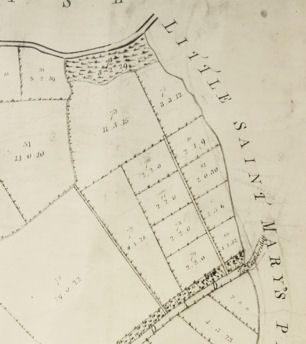
| Extract from A Map of the Parish of Trumpington in the County of Cambridge, 1804, reproduced by permission of Cambridgeshire Archives, R60/24/2/70(a). |

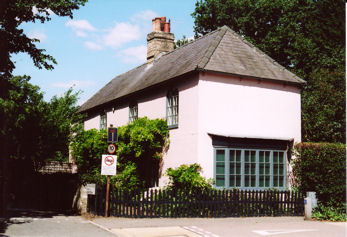
| Willers' Nursery. Photograph: Cambridgeshire Collection, reproduced in Trumpington Past & Present, p. 52. |
| 2 Latham Road and the Latham Road/Trumpington Road junction. Photo: Andrew Roberts, July 2008. |
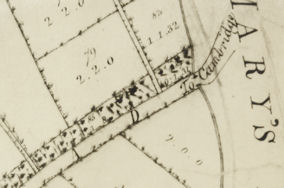
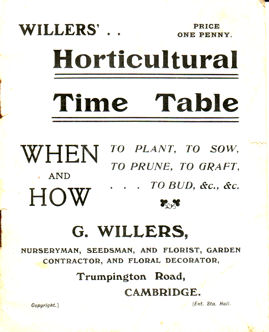
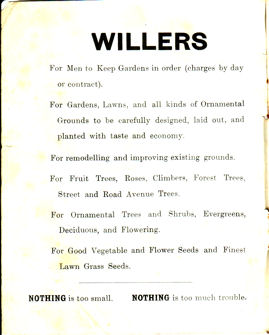
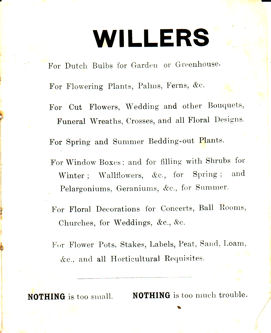
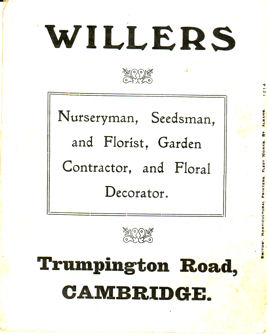
| Extract from booklet produced for Willers Nursery, c. 1920s. Source: Trumpington Gardening Society. |